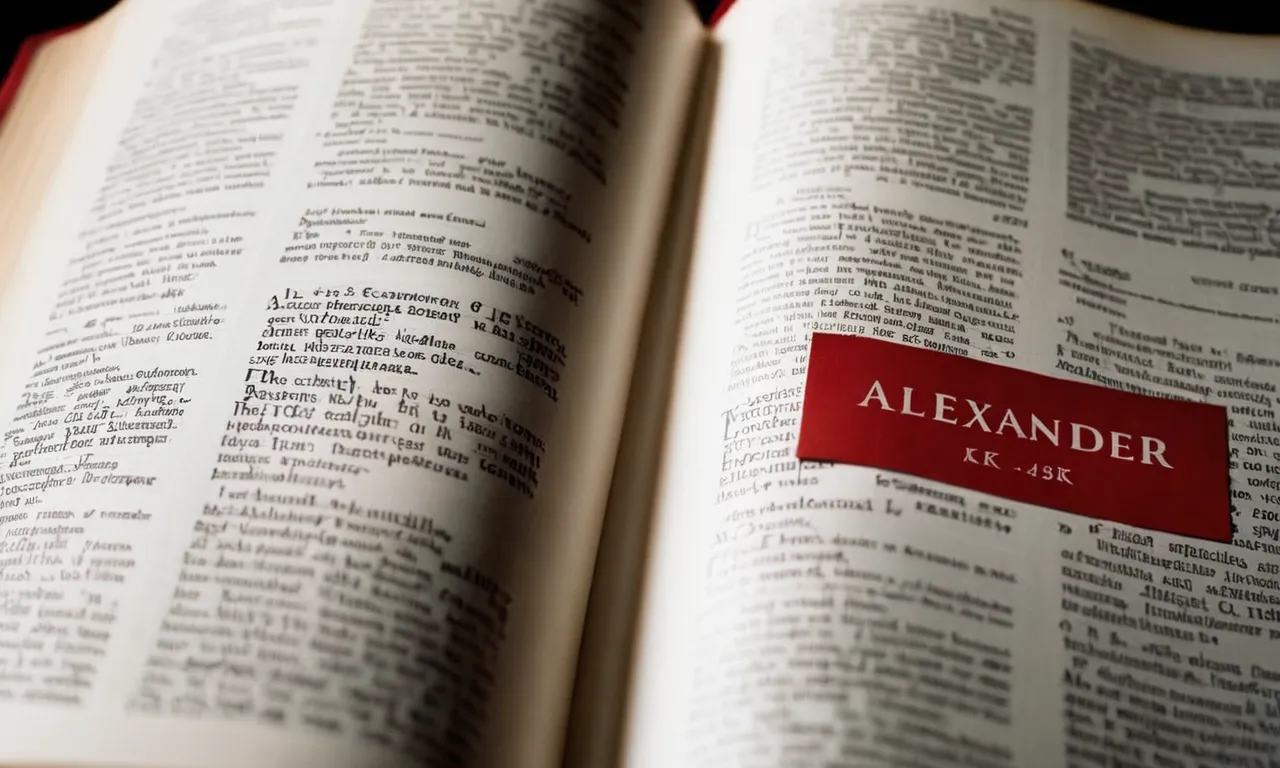What Does The Name Alexander Mean In The Bible?
If you’re wondering what the name Alexander means in the Bible, you’ve come to the right place. In short, the name Alexander means ‘defender of mankind’ or ‘protector of men’. But there’s much more to this powerful, ancient name than just its simple meaning.
In this comprehensive guide, we’ll explore the meaning, history, and significance of the name Alexander in the Bible and Christian tradition. You’ll learn about the most famous Biblical Alexanders, how early Christians interpreted the name, and why it remains so popular centuries after the last books of the Bible were written.
The Meaning and Origin of the Name Alexander
The Etymological Meaning
The name Alexander is derived from the Greek name Alexandros (Αλεξανδρος), which is a compound name composed of the elements alexein (αλεξειν), meaning “to defend”, and aner (ανηρ), meaning “man”. Hence, the name originally meant “defender of men” or “protector of men”.
This etymology reflects the characteristics associated with the name Alexander throughout history. Famous bearers of the name, such as Alexander the Great and Alexander Hamilton, were known as strong leaders and strategists.
The meaning of the name evokes images of someone who defends and protects others.
Use of the Name in Ancient Greece and Macedonia
The name Alexander was common in ancient Greece, being borne by various historical and mythological figures. However, it became extremely popular after the conquests of Alexander III of Macedon, better known as Alexander the Great (356 BC – 323 BC).
As the king of Macedonia who created one of the largest empires of the ancient world stretching from Greece to northwest India, Alexander the Great was revered as a military genius and dynamic leader.
After his death, many Hellenistic rulers sought to associate themselves with his legacy by taking the name Alexander. This further amplified the name’s popularity in the Mediterranean region.
In the centuries after Alexander the Great’s rule, Alexander remained a well-used name among Greek communities globally. It also gave rise to variant forms in other languages, including the Latin variant Alexandrus which continues to be used widely across European languages.
Alexanders in the Bible
Alexander the Great in the Book of Daniel
Alexander the Great, also known as Alexander III of Macedon, appears in the Old Testament book of Daniel. Specifically, Daniel chapter 8 contains an intricate prophecy believed to describe Alexander’s rise to power, his military conquests, and the subsequent division of his empire after his death.
In Daniel’s vision, a male goat with a prominent horn (interpreted as Alexander) charges out of the west with incredible speed and power, defeating the ram with two horns (representing the Medes and Persians).
This symbolizes Alexander’s conquest of the Persian Empire around 331 BC after multiple decisive battles.
The prophecy continues that at the height of Alexander’s power, his large horn breaks and gives way to four smaller horns. Indeed, Alexander died young in 323 BC at just 32 years old, causing his vast empire to fracture into four Hellenistic kingdoms ruled by his generals: the Seleucid Empire, Ptolemaic Egypt, Macedon and Greece, and the Antigonid dynasty in Asia Minor.
Thus, the book of Daniel provides astonishing historical “foresight” into Alexander’s meteoric rise and fall hundreds of years before his birth. This established his legacy in the Bible as an unstoppable military leader who toppled nations and changed the course of biblical history.
Modern archaeology and records also confirm many precise details around key events and timelines along Alexander’s path described in Scripture.
Alexander the Coppersmith in the New Testament
Alexander the coppersmith is briefly mentioned by the apostle Paul as an enemy of the gospel in 2 Timothy 4:14-15. Little is concretely known about his background.
Paul stated that Alexander did him “a great deal of harm” and strongly opposed his preaching. Some scholars propose that this Alexander may have been a metalworker in Ephesus who stirred up trouble against Christianity, likely by influencing authorities or spreading false charges.
In any case, Paul asserts that “the Lord will repay him for what he has done.” This indicates Alexander likely betrayed Paul or attacked him unfairly in some personal way. As an apostle proclaiming constant persecution, Paul leaves justice over the matter to God.
Beyond this reference, Alexander disappears from Scripture. But he represents opponents of the early Christian movement, which endured regular hostilities from various groups. The table below compares the two significant Alexanders covered in the Bible:
| Name | Alexander the Great | Alexander the Coppersmith |
| Type | King and military conqueror | Metalworker (?) and opponent of Paul |
| Location | Greece & Persian Empire (300s BC) | Ephesus (?); New Testament era |
| Legacy | Established vast Hellenistic empire; fulfilled prophecy in Daniel 8 | Obscure personal enemy of Paul mentioned in 2 Timothy |
To delve deeper, sites like GotQuestions.org, BibleRef.com, and BibleStudyTools.com provide excellent references on the biblical Alexanders covered here.
Significance of the Name Alexander for Early Christians
Seen as an Archetype of Strength and Leadership
The name Alexander, meaning “defender of mankind” in Greek, took on special significance among early Christians (https://www.behindthename.com/name/alexander). Alexander the Great had conquered much of the known world in the 4th century BC and was seen as the ultimate warrior-king.
To early Christians facing Roman persecution, Alexander became an archetype of strength and leadership in defending the faith.
Stories of Alexander’s military conquests and wise rule were well known across the Mediterranean world. According to the historian Josephus, Alexander was even revered by some Jews for his respect towards their faith and temple in Jerusalem (https://www.livius.org/articles/person/alexander-the-great/).
So when early Christian parents named their sons Alexander, they likely hoped their child would embody such heroic virtues. Indeed, several early saints and martyrs bore this name, taking a bold stand against Roman religious oppression.
Associated with Defending the Faith Against Persecution
In the Bible, Mark 15:21 mentions an Alexander who was compelled to carry Jesus’ cross on the way to Golgotha. To early Christians, this suggested that just as Alexander the Great conquered the world, believers must be ready to figuratively “carry the cross” and make sacrifices in spreading the gospel.
The name Alexander became so connected with defending Christianity that according to tradition, when the Roman emperor Maximian ordered all Christian churches destroyed in 306 AD, a bold Christian leader named Alexander confronted him and was promptly martyred (https://www.catholic.org/saints/saint.php?saint_id=342).
After Constantine legalized Christianity in 313 AD, the name Alexander grew even more popular among Christians. It remains a well-used name to this day, carrying ongoing connotations of leadership, strength, and commitment to high ideals.
The Enduring Popularity of the Name Alexander
Use in Medieval and Renaissance Europe
The name Alexander, meaning “defender of the people” in Greek, has remained popular for centuries. During the Middle Ages, the legend of Alexander the Great as the heroic conqueror spread across Europe.
Twelve European kings took Alexander as their name from 1066 to 1600s, inspired by Alexander the Great’s image.Even Christopher Columbus named islands in the Caribbean “Alexandria” after the legendary leader.
In Renaissance Italy, Alexander emerged among Christians as a classic yet versatile choice. Of 112,000 Florentine men documented from 1427 to 1600, over 1,500 bore Alexander. Historians note the Christian monarchs Ferdinand of Aragon and Catherine of Aragon named their sons John, Joanna, and Alexander in keeping with revival of Hebrew sacred names.
BehindtheName.com indicates Alexander’s endurance across cities like Rome, Venice, Florence, and Naples into modern day.
Prominence Among Modern Christians
The name Alexander continues to thrive across Western Europe and the Americas due to its Greek roots and Biblical ties. It ranked as 2020’s ninth most popular name for boys in the United States. The Social Security Administration recorded over 15,000 newborn American boys registered as Alexander that year, a testament to the name’s longevity across cultures.
Scholars suggest the name resonates among Christians not only for the ancient Macedonian conqueror, but due to several biblical references. In Mark 15:21, Alexander appears as the father of Rufus and possible early Christian mentioned by Paul.
Multiple Council of Alexandria bishops and over a dozen Catholic/Orthodox saints also carried the name. With both historic and religious symbolism, Alexander persists as a recognizable marker of faith and leadership for Christians worldwide.
Conclusion
The name Alexander has a rich history stretching back to ancient Greece, and a special significance in the Bible and Christian tradition. Its core meaning of ‘defending’ and ‘protecting’ made it the perfect name for rulers and warriors, including Alexander the Great.
While less common today than classic Biblical names like John or Mary, Alexander continues to be popular among Christians looking for a sturdy, distinguished name with spiritual resonance. So next time you meet an Alexander, you can appreciate the profound meaning carried by his storied name.








